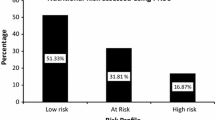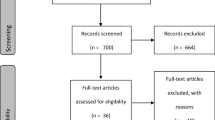Abstract
Purpose of Review
Poor weight gain is a common presenting problem in pediatrics. We review literature supporting the notion that extensive workup is generally not needed, particularly in younger children and discuss a management approach depending on a patient’s age.
Recent Findings
Understanding normal growth, particularly in infancy, is important. Breastfed and formula-fed infants as well as older children have different etiologies for poor growth. Diagnostic workup and hospitalization are rarely indicated or useful. An attempt to increase energy intake is often the appropriate first step in management.
Summary
Poor weight gain can affect children of all ages. Understanding expected growth, common etiologies by age, and how to assess nutritional status can help with appropriate diagnostic workup and management.
Similar content being viewed by others
References and Recommended Reading
Papers of particular interest, published recently, have been highlighted as: • Of importance •• Of major importance
•• Olsen EM. Failure to thrive: still a problem of definition. Clin Pediatr (Phila). 2006;45:1–6. This paper acknowledged the lack of consensus definition for failure to thrive via a cross-sectional review of articles on failure to thrive to better define this entity.
Mitchell WG, Gorrell RW, Greenberg RA. Failure-to-thrive: a study in a primary care setting. Epidemiology and follow-up. Pediatrics. 1980;65:971–7.
Corbett SS, Drewett RF. To what extent is failure to thrive in infancy associated with poorer cognitive development? A review and meta-analysis. J Child Psychol Psychiatry. 2004;45:641–54.
• Rudolf MC, Logan S. What is the long term outcome for children who fail to thrive? A systematic review. Arch Dis Child. 2005;90:925–31. This was a systematic review including 13 cohort studies to determine long-term outcomes in children with failure to thrive.
•• Mehta NM, Corkins MR, Lyman B, Malone A, Goday PS, Carney LN, Monczka JL, Plogsted SW, Schwenk WF. American Society for Parenteral and Enteral Nutrition Board of Directors. Defining pediatric malnutrition: a paradigm shift toward etiology-related definitions. JPEN J Parenter Enteral Nutr. 2013;37:460–81. A pediatric malnutrition definitions workgroup reviewed existing literature related to various domains of malnutrition to arrive at an overall new definition and classification scheme.
Guenter P, Abdelhadi R, Anthony P, Blackmer A, Malone A, Mirtallo JM, Phillips W, Resnick HE. Malnutrition diagnoses and associated outcomes in hospitalized patients: United States, 2018. Nutr Clin Pract. 2021;36:957–69.
Lobo ML, Barnard KE, Coombs JB. Failure to thrive: a parent-infant interaction perspective. J Pediatr Nurs. 1992;7:251–61.
Singer LT, Song LY, Hill BP, Jaffe AC. Stress and depression in mothers of failure-to-thrive children. J Pediatr Psychol. 1990;15:711–20.
Rybak A. Organic and nonorganic feeding disorders. Ann Nutr Metab. 2015;66(Suppl 5):16–22.
Olsen EM, Petersen J, Skovgaard AM, Weile B, Jørgensen T, Wright CM. Failure to thrive: the prevalence and concurrence of anthropometric criteria in a general infant population. Arch Dis Child. 2007;92:109–14.
•• Becker P, Carney LN, Corkins MR, Monczka J, Smith E, Smith SE, Spear BA, White JV, Academy of Nutrition and Dietetics, American Society for Parenteral and Enteral Nutrition. Consensus statement of the Academy of Nutrition and Dietetics/American Society for Parenteral and Enteral Nutrition: indicators recommended for the identification and documentation of pediatric malnutrition (undernutrition). Nutr Clin Pract. 2015;30:147–61. The Academy of Nutrition and Dietetics and the American Society for Parenteral and Enteral Nutrition described a standardized set of diagnostic indicators to be used to identify pediatric malnutrition.
WHO. Malnutrition. Who/int/news-room/fact-sheets/detail/malnutrtiion. 2021. Accessed March 3 2022.
Bouma S. Diagnosing pediatric malnutrition. Nutr Clin Pract. 2017;32(52):67.
Taal HR, Vd Heijden AJ, Steegers EA, Hofman A, Jaddoe VW. Small and large size for gestational age at birth, infant growth, and childhood overweight. Obesity (Silver Spring). 2013;21:1261–8.
• Mei Z, Grummer-Strawn LM, Thompson D, Dietz WH. Shifts in percentiles of growth during early childhood: analysis of longitudinal data from the California Child Health and Development Study. Pediatrics. 2004;113:e617-27. This study assessed greater than 10,000 children up to 60 months of age to determine growth-velocity changes in early childhood.
Krugman SD, Dubowitz H. Failure to thrive. Am Fam Physician. 2003;68:879–84.
Dunn RK, Uhing M, Goday PS. Catch-down growth in infants born large for gestational age. Nutr Clin Pract. 2021;36:1215–9.
Victora CG, Barros FC, Horta BL, Martorell R. Short-term benefits of catch-up growth for small-for-gestational-age infants. Int J Epidemiol. 2001;30:1325–30.
Kerkhof GF, Willemsen RH, Leunissen RW, Breukhoven PE, Hokken-Koelega AC. Health profile of young adults born preterm: negative effects of rapid weight gain in early life. J Clin Endocrinol Metab. 2012;97:4498–506.
Nobili V, Alisi A, Panera N, Agostoni C. Low birth weight and catch-up-growth associated with metabolic syndrome: a ten year systematic review. Pediatr Endocrinol Rev. 2008;6:241–7.
Martin CR, Ling PR, Blackburn GL. Review of infant feeding: key features of breast milk and infant formula. Nutrients. 2016;8:279.
Section on Breastfeeding. Breastfeeding and the use of human milk. Pediatrics. 2012;129:e827–41.
Prentice P, Ong KK, Schoemaker MH, van Tol EA, Vervoort J, Hughes IA, Acerini CL, Dunger DB. Breast milk nutrient content and infancy growth. Acta Paediatr. 2016;105:641–7.
Lind MV, Larnkjær A, Mølgaard C, Michaelsen KF. Breastfeeding, breast milk composition, and growth outcomes. Nestle Nutr Inst Workshop Ser. 2018;89:63–77.
Bell KA, Wagner CL, Feldman HA, Shypailo RJ, Belfort MB. Associations of infant feeding with trajectories of body composition and growth. Am J Clin Nutr. 2017;106:491–8.
•• Geddes DT, Gridneva Z, Perrella SL, Mitoulas LR, Kent JC, Stinson LF, Lai CT, Sakalidis V, Twigger AJ, Hartmann PE. 25 years of research in human lactation: from discovery to translation. Nutrients. 2021;13:3071. This review thoroughly described human lactation research and seminal findings over the last 24 years.
Neville MC, Morton J. Physiology and endocrine changes underlying human lactogenesis II. J Nutr. 2001;131:3005S-S3008.
Burklow KA, Phelps AN, Schultz JR, McConnell K, Rudolph C. Classifying complex pediatric feeding disorders. J Pediatr Gastroenterol Nutr. 1998;27:143–7.
Bhatia J, Greer F, American Academy of Pediatrics Committee on Nutrition. Use of soy protein-based formulas in infant feeding. Pediatrics. 2008;121:1062–8.
Appleton J, Russell CG, Laws R, Fowler C, Campbell K, Denney-Wilson E. Infant formula feeding practices associated with rapid weight gain: a systematic review. Matern Child Nutr. 2018;14:e12602.
Treasure J, Duarte TA, Schmidt U. Eating disorders. Lancet. 2020;395:899–911.
Poulton A, Cowell CT. Slowing of growth in height and weight on stimulants: a characteristic pattern. J Paediatr Child Health. 2003;39:180–5.
Faraone SV, Biederman J, Morley CP, Spencer TJ. Effect of stimulants on height and weight: a review of the literature. J Am Acad Child Adolesc Psychiatry. 2008;47:994–1009.
• Secker DJ, Jeejeebhoy KN. Subjective Global Nutritional Assessment for children. Am J Clin Nutr. 2007;85:1083–9. The authors described the adaptation of the Subjective Global Assessment as a tool in children.
Larson-Nath C, Mavis A, Duesing L, Van Hoorn M, Walia C, Karls C, Goday PS. Defining pediatric failure to thrive in the developed world: validation of a semi-objective diagnosis tool. Clin Pediatr (Phila). 2019;58:446–52.
• Larson-Nath C, St Clair N, Goday P. Hospitalization for failure to thrive: a prospective descriptive report. Clin Pediatr (Phila). 2018;57:212–9. The authors prospectively examined children hospitalized for failure to thrive and noted most children had a negative evaluation and gained weight with behavioral interventions alone.
Sills RH. Failure to thrive. The role of clinical and laboratory evaluation. Am J Dis Child. 1978;132:967–9.
Larson-Nath CM, Goday PS. Failure to thrive: a prospective study in a pediatric gastroenterology clinic. J Pediatr Gastroenterol Nutr. 2016;62:907–13.
Maggioni A, Lifshitz F. Nutritional management of failure to thrive. Pediatr Clin North Am. 1995;42:791–810.
Sant’Anna AM, Hammes PS, Porporino M, Martel C, Zygmuntowicz C, Ramsay M. Use of cyproheptadine in young children with feeding difficulties and poor growth in a pediatric feeding program. J Pediatr Gastroenterol Nutr. 2014;59:674–8.
Boddy J, Skuse D, Andrews B. The developmental sequelae of nonorganic failure to thrive. J Child Psychol Psychiatry. 2000;41:1003–14.
Drewett RF, Corbett SS, Wright CM. Cognitive and educational attainments at school age of children who failed to thrive in infancy: a population-based study. J Child Psychol Psychiatry. 1999;40:551–61.
Black MM, Dubowitz H, Krishnakumar A, Starr RH Jr. Early intervention and recovery among children with failure to thrive: follow-up at age 8. Pediatrics. 2007;120:59–69.
Horta BL, Loret de Mola C, Victora CG. Breastfeeding and intelligence: a systematic review and meta-analysis. Acta Paediatr. 2015;104:14–9.
Singer LT, Minnes S, Min MO, Lewis BA, Short EJ. Prenatal cocaine exposure and child outcomes: a conference report based on a prospective study from Cleveland. Hum Psychopharmacol. 2015;30:285–9.
Author information
Authors and Affiliations
Corresponding author
Ethics declarations
Conflict of Interest
Tanyaporn K. Kaenkumchorn and Praveen S. Goday each declare no potential conflicts of interest.
Human and Animal Rights and Informed Consent
This article does not contain any studies with human or animal subjects performed by any of the authors.
Additional information
Publisher's Note
Springer Nature remains neutral with regard to jurisdictional claims in published maps and institutional affiliations.
This article is part of the Topical Collection on Pediatric Gastroenterology
Rights and permissions
About this article
Cite this article
Kaenkumchorn, T.K., Goday, P.S. Poor Weight Gain. Curr Treat Options Peds 8, 369–381 (2022). https://doi.org/10.1007/s40746-022-00253-y
Accepted:
Published:
Issue Date:
DOI: https://doi.org/10.1007/s40746-022-00253-y




